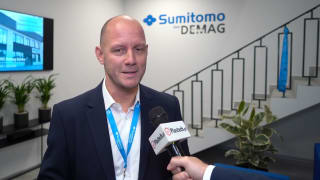New: complete micro-injection unit
Evidence of Arburg's targeted approach to the development of its machine and component range will also be demonstrated in a micro-injection moulding exhibit. Following the micro-injection module, the Arburg range now includes a complete micro-injection unit in Euromap size 5, which will be unveiled for the first time at the Fakuma. The exhibit, which will be built around an electric Allrounder 270 A is designed as a production unit for micro parts and produces four 0.03 gram micro counter wheel. A clean room enclosure ensures a clean environment and the micro-injection unit enables very precise plasticising. It combines a 15-millimetre screw for melting the material with an 8-millimetre injection screw. This means that standard granulate can be used to achieve very small shot weights and tolerances measured in microns.In addition, there is the specially configured Multilift H 3+1 horizontal robotic system, which removes the sprue and the delicate micro parts and gently sets them down, segregated according to cavity.
Industry 4.0: a glimpse of tomorrow today
Also when it comes to important future topics, such as Industry 4.0, functional integration and lightweight construction, Arburg will show just what is possible in practice at the Fakuma.Industry 4.0 is a future project involving the vision of a smart factory. This requires the networking of machines, order information and process data. The fact that this vision can already be a reality will be demonstrated by Arburg at the Fakuma with the optional production of left and right-handed scissors on an electric Allrounder 370 E. An individual QR code will then be applied by laser, so that all of the most important process parameters of the relevant item can be retrieved online. The Arburg host computer system (ALS) is of central importance here, networking various independent stations, recording all the parameters and transmitting them to a web server. The scissors can then be customised to individual requirements using the Freeformer.
Enhanced efficiency: reducing weight, integrating functions
The production of a lightweight component for the automotive industry that also has a high level of rigidity will be demonstrated by a hydraulic Allrounder 820 S using long-fibre direct injection moulding. The advantages of this process include the flexible adjustment of the fibre length to up to 50 millimetres, the low incidence of fibre damage in the plastic melt and the lower material costs in comparison with long-fibre granulates.Another interesting lightweight construction process is Particle-foam Composite Injection Moulding, which Arburg will present at the Fakuma with an example of function integration, the main topic of the Blue Competence campaign "There's more to plastic", run by the Plastics and Rubber Machinery Association (KuG) within the German Machinery and Plant Manufacturers Association (VDMA). Together with its partners Krallmann and Ruch Novaplast, Arburg will be showing the practical application of this innovative process. A foamed part product component will be produced on the compact foaming system integrated in the production cell. A six-axis robotic system inserts this into the injection mould, where a thread is moulded on in a positive bond. These composite parts – consisting of a foamed and a moulded plastic component – can be integrated in a further step as standardised parts for example in a foamed housing, enabling media lines to be connected easily with an effective seal.



